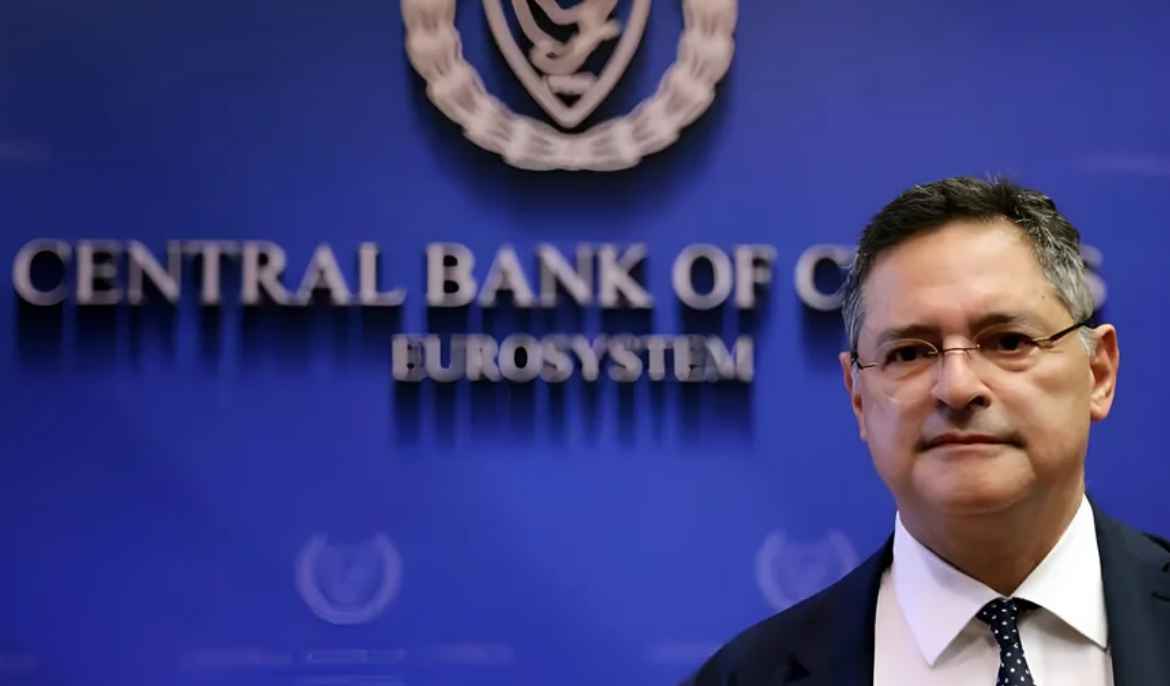The Central Bank of Cyprus (CBC) aims to maintain stable prices and a sound financial system, according to governor Christodoulos Patsalides.
Speaking at the 12th Banking Forum and Fintech Expo on Thursday, Patsalides said that “by embracing the digital economy, ensuring robust governance, and addressing climate change, we are positioning Cyprus as a forward-looking financial hub in Europe“.
“Together, we will navigate the challenges and opportunities of the future, ensuring stability and prosperity for all,” he added.
This was further underlined in Patsalides’ opening remarks, where he said the CBC’s agenda “focuses on embracing digital transformation, ensuring robust governance, addressing societal and environmental challenges, and safeguarding financial stability”.
Commenting on the Cyprus economy, he said that country’s key sectors include construction, tourism, trade, shipping, and information communication technology (ICT).
These sectors, he explained, have enabled the economy to resilient and adaptable “despite the consecutive significant geopolitical challenges, including the ongoing conflicts in Ukraine and the Middle East”.
“In recent years, Cyprus has achieved robust growth rate well above the EU average and maintained a strong fiscal position, consistently posting surpluses that have bolstered public finances,” he said.
“As a result, international rating agencies have upgraded their ratings well within the investment grade, highlighting our sound economic management, fiscal discipline, and reforms in the banking sector,” he added.
Regarding the Cypriot banking sector, the CBC governor epxlained that “it has built up remarkable resilience and robustness despite a series of unprecedented and successive crises in recent years”.
He pointed out that the sector’s solvency, as measured by the Common Equity Tier 1 (CET1) ratio, rose to 23.5 per cent in the third quarter of 2024, “achieving its highest level on record and significantly surpassing the European average of 16 per cent”.
Additionally, the Liquidity Coverage Ratio (LCR)—a key indicator of credit institutions’ capacity to withstand severe liquidity stress—reached 336 per cent in September 2024.
He stated that “this level exceeds the regulatory minimum of 100 per cent by more than threefold and stands well above the European average of 161.4 pe cent”.
In addition, the non-performing loan (NPL) ratio fell to 6.5 per cent in the third quarter of 2024, “marking its lowest level since 2014, when the NPL definition was standardised across the European Union”.
“However”, he continued, “there is no room for complacency as macroeconomic uncertainty, geopolitical risks, and emerging threats like cyber and climate risks grow”.
“Banks must adapt quickly to identify and address these evolving challenges effectively,” Patsalides said.
“Moreover, technological advancements bring about a new landscape in which banks are called upon to compete,” he added, noting that “the pursuit of an appropriate business model is key”.
In terms of the future of the digital economy and its impact on global trends, Patsalides said that technological advancements have the potential to enhance living standards and the long-term productivity of economies.
He mentioned that innovative technologies such as artificial intelligence, cloud computing, digital wallets, big data analytics, and biometrics are already being utilised in financial services to improve customer service, automate payments, and reengineer business processes.
However, he said that technologies like distributed ledger technology (DLT), smart contracts, and tokenisation have yet to reach their full potential.

The CBC governor also raised concerns about the risks associated with these technological advancements.
He explained that “as technology becomes more widespread in our evolving digital economy, cyber risk and data security continue to be by far the most prominent driver of operational risk for banks”.
“Technological advances with increased sophistication, growing reliance on digital solutions, but also growing capabilities of cyber offenders, have all resulted in enhanced risk exposure for banks, including vulnerability to sophisticated cyber-attacks,” he stated.
“Cyber risk is often driven by geopolitical risk, thus raising overall risk to a much higher level,” he added, noting that “supervising these risks remains one of our priorities”.
In addressing the responsible integration of innovative technologies, Patsalides touched on the importance of various regulatory measures.
These invovle key pieces of EU legislation, including DORA, PSD3, FiDA, MiCAR, and the AI Act, which aim to strengthen financial sector resilience while promoting consumer and investor confidence.
“Recognising the evolving market dynamics, the Central Bank of Cyprus has established an Innovation Hub to foster dialogue with fintech stakeholders and support domestic financial innovation,” he said.
Discussing the rise of digital payments in Cyprus, the governor mentioned that 96 per cent of cashless payments in Cyprus are now conducted digitally.
At the same time, cash usage has declined by 11 per cent since 2022, positioning Cyprus as a leader among euro area countries in this regard.
Furthermore, Cypriots are embracing card payments, using them 1.3 times more frequently than the European average, with contactless card payments consistently accounting for more than half of all card transactions since 2022.
This trend reflects both the readiness of local businesses to adopt card terminals with Near-Field-Technology and the growing consumer preference for digital transactions.
“In the same vein, e-commerce exhibits gradual expansion, manifested by online purchases via cards almost doubling over a six-year period to 28 per cent of the total of card payments,” he said.
“It is indeed remarkable that the use of mobile phones for online purchases has almost reached one quarter of the total, outperforming the EU average which stands at 16,” he added.
Highlighting a recent milestone, the governor said that “as of the 9th of January of this year, instant payments have become a reality for all banking participants”.
This new system enables account-to-account payments to be completed within 10 seconds, offering immediate access to funds around the clock.
“Consumers and businesses will reap the benefits in the months to come,” Patsalides said.
The CBC governor also commented on the growing importance of electronic money institutions (EMIs) and payment institutions (PIs).
He mentioned that the CBC has licensed four new electronic money institutions this year, bringing the total under its supervision to 27 EMIs and 11 PIs.
“As part of our broader strategic agenda, we are committed to drawing on international experience in supporting the Central Bank of Cyprus in refining its approach for regulating, licencing and supervising Electronic Money Institutions (EMIs) and Payment Institutions (PIs) in Cyprus,” the governor stated.
What is more, the CBC announced the establishment of a comprehensive licensing and supervisory strategy for these institutions in December.
The governor explained that the development of this strategy involved the appointment of an international consultancy firm.
“For the development of this strategy, the CBC appointed an international consultancy firm whose experts, in collaboration with CBC staff, conducted an analysis of the sector and its inherent risks,” he said.
The primary aim of the strategy, according to the CBC, is to ensure the prudent and sustainable growth of the sector. To achieve this, he said, the strategy incorporates several key measures.
These include enhancing and enriching the licencing processes for institutions applying to join the sector, strengthening the supervision of institutions by adopting a risk-based supervisory approach tailored to each institution, and implementing best practices for the sector’s operation.
“To achieve these objectives, a Division for the Supervision of Electronic Money and Payment Institutions is being established, which will henceforth undertake the prudential supervision of the sector,” he said.
Patsalides also provided a status update on the digital euro, saying that there has been progress since last year.
He mentioned that legislative negotiations are ongoing in Brussels, while the Eurosystem continues its preparation phase, focusing on setting holding limits without disrupting financial stability or bank intermediation.
He added that banks will maintain their role with customers, and specific holding entitlements will be determined later.
A rulebook, developed with stakeholder input, will outline standards for distributors, leveraging existing frameworks for cost efficiency and allowing innovation.
Meanwhile, consumer priorities, such as conditional payments and easy bill-splitting, are shaping expectations for future services.
“The ECB is now selecting candidates from its recent application process and plans to enhance engagement with distributors to ensure readiness for the potential issuance and successful distribution of the digital euro, if and when the decision to issue is made,” he said.
He further explained that the CBC has been actively raising awareness about the project through communication efforts targeting the public, businesses, and financial institutions.
These include regular articles, stakeholder meetings at the CBC premises, and high-profile events, such as a July press conference with ECB executive board member Piero Cipollone.
The CBC, he said, also “participates in panel discussions and presents the digital euro project at various local and international conferences”.
Patsalides also said that strong governance is key to enhancing transparency and compliance in financial institutions.
He pointed out that social factors like diversity and fair practices bolster resilience and trust.
On climate change, the CBC, he said, engages in ECB-led assessments and supervises institutions to integrate ESG risks, supported by its internal Sustainability Team and targeted initiatives.


